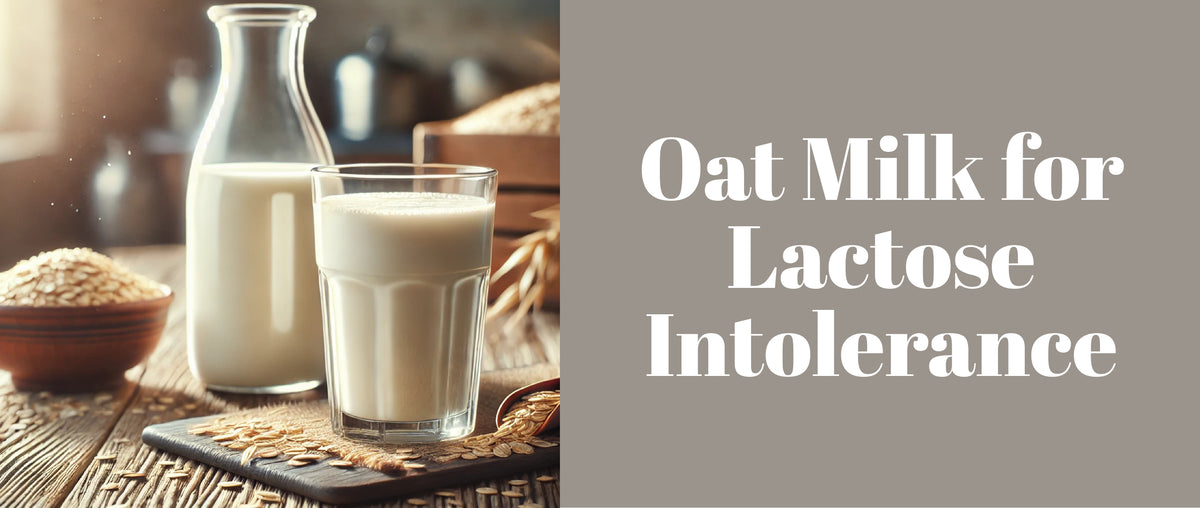Oat Milk for Lactose Intolerance
Lactose intolerance is a common digestive issue affecting millions worldwide, causing discomfort and limiting dairy consumption for those who suffer from it. Fortunately, plant-based milk alternatives like Oat Milk offer a nutritious, flavorful, and lactose-free option that can fit seamlessly into a healthy lifestyle. Beyond just a milk alternative, oat milk has become a versatile choice in both cooking and baking, enjoyed for its creamy texture and health benefits.
For individuals who are lactose-intolerant, oat milk offers numerous advantages. Whether you're crafting a healthy smoothie recipe or exploring other Vegan products like vegan butter or plant based cheese , oat milk can support your dietary needs without compromising on taste or nutrition.
Key Takeaways
- Oat milk is naturally lactose-free, making it ideal for those with lactose intolerance.
- It is a highly versatile and nutritious alternative, often fortified with essential nutrients like calcium and vitamin D.
- The mild taste and creamy consistency make it a popular choice in recipes ranging from coffee to baked goods.
Understanding Lactose Intolerance
What is Lactose Intolerance?
Lactose intolerance occurs when the body lacks sufficient lactase, the enzyme required to break down lactose—the sugar found in dairy products. Without this enzyme, lactose remains undigested in the gut, leading to symptoms such as bloating, gas, and diarrhea. Lactose intolerance can range from mild to severe, and for many, dairy consumption results in digestive distress, making alternatives like Oat Milk essential.
Why Choose Lactose-Free Alternatives?
Traditional dairy products, including milk and cheese, are high in lactose. Individuals with lactose intolerance often seek alternatives that provide similar flavors and nutritional benefits without triggering symptoms. Oat milk is one of the most popular choices for this purpose, as it is:
- Free from lactose and suitable for a wide range of diets, including vegan and gluten-free (if certified).
- Low in allergens compared to options like soy and almond milk, as it’s free of common allergens like nuts and soy.
- An ideal option for those interested in healthy living and liver healthy foods due to its high fiber content and beneficial nutrients.

Why Oat Milk is Ideal for Lactose Intolerance
The Benefits of Oat Milk as a Dairy-Free Milk Alternative
Oat milk stands out among plant-based milk alternatives for its creamy, dairy-like texture and mild flavor, which makes it highly versatile in the kitchen. Many who try oat milk as a replacement for traditional dairy find that it works well in recipes that call for milk, from coffee to savory dishes and even desserts. Here are some reasons why oat milk is an excellent choice:
- Rich in Nutrients: Oat milk is often fortified with calcium, vitamin D, and vitamin B12, providing nutrients commonly found in dairy. For those seeking healthy weight loss options, oat milk offers a lower-calorie profile, especially when unsweetened.
- Digestibility: Unlike dairy, which can cause digestive discomfort for those with lactose intolerance, oat milk is easily digestible. Its natural fiber content, especially beta-glucan, may aid in digestion and support heart health.
- Eco-Friendly and Sustainable: Oat milk has a significantly lower environmental footprint compared to dairy milk, requiring less water and land for production. This sustainable aspect aligns with the values of those interested in vegan and environmentally conscious products.
Oat Milk Compared to Other Plant-Based Milks
When choosing between oat milk and other plant based milk options like almond or soy, many factors come into play:
| Milk Type | Key Nutritional Benefits | Digestibility | Allergens |
|---|---|---|---|
| Oat Milk | Fiber, calcium, vitamin D, B vitamins | Highly digestible | None (if gluten-free) |
| Soy Milk | Protein, calcium, iron | May cause bloating | Contains soy |
| Almond Milk | Vitamin E, calcium, low calories | Light but not as creamy | Contains nuts |
Health Benefits of Oat Milk for Lactose-Intolerant Individuals
For those with lactose intolerance, oat milk offers multiple health benefits beyond just being lactose-free:
- Heart Health: Oat milk contains beta-glucan, a type of fiber known to support heart health by helping to lower cholesterol. This makes it a valuable choice for those pursuing a healthy lifestyle and managing cholesterol levels.
- Low in Saturated Fat: Unlike some dairy products like unsalted butter or parmesan cheese, oat milk has minimal saturated fat, supporting overall heart health and aiding in healthy weight loss efforts.
- Digestive Benefits: Due to its fiber content, oat milk may help improve digestive health, making it a gentle choice for those with sensitive stomachs.
Choosing the Right Oat Milk for Your Needs
Selecting the right type of oat milk can enhance its health benefits. Here are a few popular choices available online:
- Unsweetened Oat Milk: Low-calorie and suitable for those watching their sugar intake.
- Fortified Oat Milk: Contains added vitamins and minerals like calcium and vitamin D, mirroring the nutritional benefits of dairy.
- Organic and Gluten-Free Oat Milk: Best for those avoiding gluten and seeking a more natural option.
When selecting oat milk, especially for cooking or recipes, be mindful of ingredients. Many plant based products may include preservatives, artificial sweeteners, or added flavors, so checking labels is key.
Also Read
Integrating Oat Milk into Your Diet
Oat milk is an incredibly versatile addition to the diet. Here’s how you can use it in various recipes:
- Coffee and Tea: Oat milk is creamy and steams well, making it a great addition to lattes and cappuccinos.
- Smoothies: Add oat milk to a healthy smoothie recipe for a rich and creamy texture, without any added lactose.
- Cooking and Baking: Substitute oat milk for cow’s milk in recipes like pancakes, muffins, and creamy soups.
Nutritional Profile of Oat Milk
When choosing a milk alternative, it’s essential to consider its nutritional profile. Oat milk provides a balanced combination of carbohydrates, fiber, and healthy fats, making it an excellent choice for both lactose-intolerant individuals and anyone looking to enjoy a healthy lifestyle.
Macronutrient Breakdown
Here’s a closer look at the nutritional composition of oat milk per 1-cup serving:
| Nutrient | Amount per Serving | Health Benefits |
|---|---|---|
| Calories | ~120 kcal | Energy-providing and supports healthy weight. |
| Protein | ~3g | Important for muscle maintenance. |
| Carbohydrates | ~15g | Main energy source, with slower digestion due to fiber. |
| Fiber | ~2g (beta-glucan) | Supports heart health and digestion. |
| Fat | ~5g | Provides essential fats with low saturated fat. |
Vitamins and Minerals in Oat Milk
Oat milk is often fortified with essential vitamins and minerals to mirror the nutrients found in dairy milk, providing benefits for bone health, immunity, and general wellness:
- Calcium: Essential for bone health; oat milk is often fortified to match dairy milk levels.
- Vitamin D: Important for immune function and bone strength; commonly added in fortified oat milk.
- Vitamin B12: Critical for nerve function and red blood cell formation, making it especially valuable for those on a vegan diet.
- Iron: Contributes to energy production and helps prevent anemia, especially beneficial in plant-based diets.
The fortified nutrient profile makes oat milk an excellent choice for those aiming to maintain bone health, similar to how traditional dairy or plant based cheese is fortified to support a balanced diet.
Health Benefits of Oat Milk for Lactose-Intolerant Individuals
Oat milk is not only a fantastic alternative for those with lactose intolerance but also supports multiple health goals thanks to its unique composition.
Heart Health and Cholesterol Reduction
One of the standout benefits of oat milk is its high content of beta-glucan. This soluble fiber has been shown to lower cholesterol levels by binding with cholesterol in the digestive system, helping to reduce the amount that enters the bloodstream. This benefit makes oat milk particularly suitable for those aiming to prevent cardiovascular issues while managing lactose intolerance.
Unlike traditional dairy products like parmesan cheese or fat-free butter, oat milk’s beta-glucan fiber can actively contribute to heart health. Additionally, Cashew Butter and vegan butter often contain more saturated fats, which oat milk avoids, making it a heart-friendly choice.
Digestive Health and Fiber Benefits
The fiber in oat milk not only supports heart health but also aids in digestion. Oat milk’s beta-glucan content encourages the growth of beneficial gut bacteria, promoting a healthier gut microbiome. This fiber also supports a smooth digestive process, reducing the risk of bloating and other digestive discomforts common with dairy.
Allergy-Friendly and Lactose-Free
For those with multiple allergies or sensitivities, oat milk offers a safe and enjoyable alternative. Unlike nut-based milks, oat milk is free of nuts, making it suitable for those with tree nut allergies. Additionally, it is naturally free from lactose, making it ideal for those with lactose intolerance. While oat milk may contain gluten depending on how it’s processed, many brands offer gluten-free versions, making it even more accessible.

Environmental Benefits of Oat Milk
One of the reasons oat milk has gained so much popularity is its environmental sustainability. Compared to dairy milk and other plant-based options, oat milk production requires fewer resources and has a lower environmental impact.
Water and Land Efficiency
Oats require less water than dairy milk production or other plant-based options like almond milk. Here’s a quick comparison:
| Type of Milk | Water Usage (L per 1L of milk) | Environmental Impact |
|---|---|---|
| Oat Milk | ~48 | Low carbon footprint |
| Dairy Milk | ~628 | High water usage |
| Almond Milk | ~371 | Higher water requirement |
Reduced Carbon Footprint
Switching to oat milk is a choice aligned with sustainable living. The carbon emissions involved in dairy farming are significantly higher than those associated with oat farming. By choosing oat milk or other vegan products, consumers can make a positive impact on the planet by reducing their carbon footprint and supporting more sustainable agricultural practices.
Plant-Based Products for a Healthy Planet
As part of the broader healthy lifestyle movement, plant-based products like vegan cheese and oat milk play a role in lowering demand for intensive dairy farming. Other vegan choices, including unprocessed cheese alternatives and fat-free cheese made from plants, further help in reducing our reliance on dairy, making a shift toward sustainability.
Choosing the Best Oat Milk and Other Vegan Options
For those interested in incorporating more plant-based options into their diet, oat milk is just the beginning. You can explore a variety of Vegan products like cashew butter, mozzarella cheese block, or even Garlic Butter for enhanced flavors. If you’re looking to buy mozzarella cheese or find the best mozzarella cheese for pizza, many plant-based brands offer excellent options that mimic the creaminess and melt of traditional dairy cheese.
Conclusion
Switching to oat milk can be a game-changer for those with lactose intolerance, as well as anyone seeking a nutritious, versatile, and eco-friendly alternative to dairy. With its creamy texture, rich nutrient profile, and gentle impact on digestion, oat milk offers numerous advantages over dairy milk and other plant-based alternatives.
For those pursuing a healthy lifestyle, oat milk’s high fiber and low saturated fat content support heart health and overall wellness. Its naturally lactose-free, allergy-friendly nature makes it accessible to a broad range of dietary needs. Beyond personal health, oat milk has a smaller environmental footprint than dairy, which aligns with the values of many looking to make eco-conscious choices.
Whether you’re looking to create a healthy smoothie recipe, find liver-healthy foods, or explore more plant based products, oat milk provides a versatile and sustainable solution. With options available for every taste—from unsweetened varieties to enriched, fortified options—there’s an oat milk product for everyone.
Do you enjoy vegan food? We have a list of vegan restaurants in India to help you find delicious options in your area!










